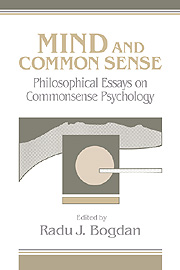Book contents
- Frontmatter
- Contents
- List of Contributors
- 1 The Folklore of the Mind
- 2 Analysis without Noise
- 3 Folk Psychology and the Explanation of Human Behavior
- 4 Methodological Reflections on Belief
- 5 Consciousness and Content
- 6 The Inevitability of Folk Psychology
- 7 How is Eliminative Materialism Possible?
- 8 The Long Past and the Short History
- 9 Common Sense Naturalized: The Practical Stance
- Index
3 - Folk Psychology and the Explanation of Human Behavior
Published online by Cambridge University Press: 24 September 2009
- Frontmatter
- Contents
- List of Contributors
- 1 The Folklore of the Mind
- 2 Analysis without Noise
- 3 Folk Psychology and the Explanation of Human Behavior
- 4 Methodological Reflections on Belief
- 5 Consciousness and Content
- 6 The Inevitability of Folk Psychology
- 7 How is Eliminative Materialism Possible?
- 8 The Long Past and the Short History
- 9 Common Sense Naturalized: The Practical Stance
- Index
Summary
Folk psychology, insist some, is just like folk mechanics, folk thermodynamics, folk meteorology, folk chemistry, and folk biology. It is a framework of concepts, roughly adequate to the demands of everyday life, with which the humble adept comprehends, explains, predicts, and manipulates a certain domain of phenomena. It is, in short, a folk theory. As with any theory, it may be evaluated for its virtues or vices in all of the dimensions listed. And as with any theory, it may be rejected in its entirety if it fails the measure of such evaluation. Call this the theoretical view of our self-understanding. Folk psychology, insist others, is radically unlike the examples cited. It does not consist of laws. It does not support causal explanations. It does not evolve over time. Its central purpose is normative rather than descriptive. And thus it is not the sort of framework that might be shown to be radically defective by sheerly empirical findings. Its assimilation to theories is just a mistake. It has nothing to fear, therefore, from advances in cognitive theory or the neurosciences. Call this the antitheoretical view of our self-understanding.
Somebody here is deeply mistaken. The first burden of this paper is to argue that it is the antitheoretical view that harbors most, though not all, of those mistakes. In the thirty years since the theoretical view was introduced (see, especially Sellars 1956; Feyerabend 1963; Rorty 1965; Churchland 1970, 1979, 1981), a variety of objections have been leveled against it.
- Type
- Chapter
- Information
- Mind and Common SensePhilosophical Essays on Common Sense Psychology, pp. 37 - 52Publisher: Cambridge University PressPrint publication year: 1991
- 6
- Cited by

